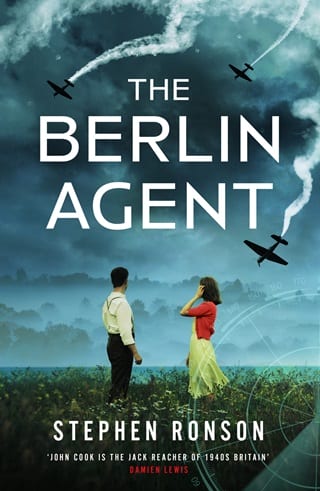1
Thursday, 6 June 940
Every window of the idling train was crammed with soldiers, leaning out, holding tin cups and cheap church-hall plates. I worked my way along the platform, teapot lifted to shoulder--height, filling each cup. Mum followed close behind, adding a splash of milk, talking with the men, making them feel like conquering heroes. Behind Mum, volunteers from the -Women’s Institute passed out sandwiches. Every house in Uckfield had answered the call for food and drink to be -delivered to the station, for our brave boys, back from Dunkirk.
German tanks had rolled through France without slowing, and our worst nightmare was realised. They’d reached the English Channel, encircling our men. Four hundred thousand men, along with every piece of artillery we possessed. We got most of the men away, a flotilla of boats shuttling them off the beaches under constant bombardment. They left the equipment behind, destroying some, abandoning the rest.
I caught the eye of a young soldier as I filled his mug. He looked away.
I didn’t hold their defeat against them. I’d been there in my day, the man in the trenches, following orders of the strategic brains back in London, or more likely back in a comfortable country house where the tea is poured into bone china, and the sandwiches are cut into triangles. Blaming the man on the front line for the strategic failure that had led to our catastrophic withdrawal from the beaches of Dunkirk was like blaming a schoolboy for failing an exam set in a language he’d never been taught.
Only a month earlier I’d gone to London to sign up. If we were going to repeat the mistakes of the Great War, better me dying in a trench than a young man with a family. But the army told me they had different plans for me. Some of them, a small faction hidden deep inside the War Office, had predicted the speed of Hitler’s sweep across France. I’d met with a curious man dressed in rumpled civvies who called himself Bunny, who told me to start preparing for the invasion. I was to form a unit of men like myself – ex-army, farmers and landowners, men who knew the countryside, who knew how to disappear into the woods. Men, and women, as it turned out. All of this was to be off the books. Hush hush.
The platform was a crush of people: volunteers shuttling trays of food and fresh teapots, carrying away empties; mothers and sweethearts, hoping against all odds to find out if their lad had made it back; soldiers hurrying to the toilets, or to post a letter, that nervous run from a train that had been idling for hours, but could leave without notice at any minute.
Further back down the line, another train waited. More blocked the line ahead. The biggest troop movement in -England’s history. We’d done the hard part, getting them off the beaches and across the Channel. Now it was all at risk if we couldn’t get them out of harm’s way. The Germans would be hot on their heels, expected any day. First the parachutists, dropped behind our lines. Then the invasion proper. The press said they’d start with artillery, firing from their battleships in the middle of the English Channel. And then, when we were appropriately softened up, the landing craft.
Everyone had a suitcase packed. If you had a car, you had the tank filled and the map ready. You didn’t want to be around when the Panzers rolled through town, their steel tracks screaming on the tarmac.
My plans would be different. When the tanks arrived, I’d put Mum and Uncle Nob in the car with our two evacuees and point them towards Scotland. I’d walk away from my farm, meet up with my team. Lie low. Wait for the invaders to pass on. Then, when German High Command declared victory and returned to Berlin, we’d start our operations. Making trouble. A killing here. A train blown up there. Whatever we could do, until they caught us. Two weeks, they estimated, the predicted life expectancy in units like ours. Give a man a crate of TNT and a few guns and he could get a lot done in two weeks. Bunny had provided the weapons. We’d hidden them away, but not safely enough. The lion’s share had been stolen by one of our number, a man I’d thought I could trust. He’d left us practically empty--handed, with barely enough to get the job done.
The bomber came out of the south, flying low. A speck in the sky, a deep rumble that was felt, rather than heard. It came out of the sun, following the train track up from the coast. Every head turned and watched, the crowd hushed. Then the first scream. An electric spark running through the crowd. A whistle, followed by shouted orders, barked by an efficient sergeant major.
‘On the ground! Now!’
Crockery smashed in the scrum. Cutlery tinkled on the concrete platform, amid the growing roar of the bomber.
Only two of us were left standing. Me, and the sergeant major at the far end of the platform, perched on the raised step of the train. He looked down the track, at the bomber that now filled the sky, then he turned to me. I met his eye. A moment of connection, perhaps the last of our lives. An understanding. Lying down on the ground was good for crowd control, for giving people something to do, but it wasn’t going to help anyone if there was a direct hit.
The plane roared over us with a rush of wind. The bomb bay doors opened. But it wasn’t our day to die. Instead of bombs, bundles of paper came tumbling from the plane on a diagonal path, the speed of the plane dictating their momentum. The wind pulled at the bundles, and they came apart in a flurry of newsprint, as the plane flew on, its roar dissipating.
There was a thump from next to me as a bundle landed intact, splitting open on impact with a slew of paper.
People got to their feet, grabbing papers, like trying to catch falling snow. I picked up a copy. It was a newspaper, although the typeface was wrong. Not one of ours. Strange how a little thing like that could look foreign.
‘An Appeal to Reason’, the headline stated politely. Not the catchiest introduction. Below, a dense block of text, -uninviting to the eye. From Hitler himself, apparently. Lucky us. Appealing to the people of England. No need for war. That sort of thing.
‘I’ll take that lot,’ a Tommy called to me from the train. He jumped down from his carriage and scooped up what he could from the remains of the bundle, checking with me as if it was my property. I nodded.
‘Got to be a week’s worth of bog roll there,’ he said, as he lugged it onto the train.
The atmosphere on the platform had changed. Before, we’d been tense, fearing the worst. Now we’d faced our fears, it was like a holiday. Perhaps it wouldn’t be so bad after all.
There was a crash several carriages back, and an ironic cheer from the boys closest to the action. I craned my neck to see what had happened. Shouts of concern. Calls for space. For air. For a doctor.
I pushed my way through the crowd, holding my teapot above my head, back past the boys I’d already served.
An elderly woman was on her knees, picking sandwiches off the platform, putting them back onto a large tray. Her cheeks were red, her eyes brimming with tears held back. Embarrassed to be the centre of attention. Angry with herself. I knelt down and helped clear the mess, throwing slices of grit-encrusted ham under the train, onto the tracks. She flashed a watery smile as we finished. As she picked up the tray, she winced.
‘I’ll take it,’ I said, pulling the tray towards me.
‘No,’ she said, reaching for it, like a tug of war.
I recognised her from a lifetime ago, when I’d been a boy, before I’d gone to war. Before a lot of things. Mrs Leckie, my first teacher at the Saunders School on Church Street. It must have been thirty-five years and she looked the same as she had then.
As she pulled the tray, the sleeve of her cardigan rode up her arm and I caught a glimpse of purple. A livid bruise. She winced again.
‘There’s enough sandwiches being handed out here to feed a division,’ I said to her. ‘I could do with a cup of tea. Come and help me find one.’ Slightly absurd, with an oversize teapot on the platform by my side, but she didn’t seem to notice.
If I’d suggested she take a break she would have refused. It would have been a sign of weakness. My asking for help gave her cover. Not to onlookers, to herself. A lifetime of bringing tea to a man when he asked, or even when he didn’t.
We sat in the waiting room as the chaos of the station continued around us. The usual smell of coal smoke and cigarettes mixed with a new smell, already familiar, wool uniforms and leather, soaked in sea water and engine oil, permeated with sweat. And underneath all of it, the smell of war, the smell of fear. If I closed my eyes I could have been back on the Western Front, or huddled in a cave in Afghanistan, where I’d learnt my craft after the Armistice. But I wasn’t at the front. I was in Uckfield, my sleepy, unremarkable home town in sleepy, unremarkable Sussex.
She gulped down her tea, in a hurry. She winced as she raised her arm.
‘I shouldn’t have come,’ she said, ‘Stan’ll be missing me.’
I presumed it was Stan who’d put the bruise on her wrist.
‘Where do you live?’ I asked.
‘Palehouse Lane, there’ll be a bus along in a minute.’
‘I’ll drive you,’ I said. ‘Got to get back myself.’
The volunteers on the platform would cope without me. Mum would make her own way home. I wanted to meet Stan. I wanted to find out more about the bruises. Have a quiet word.
 Fullepub
Fullepub 



